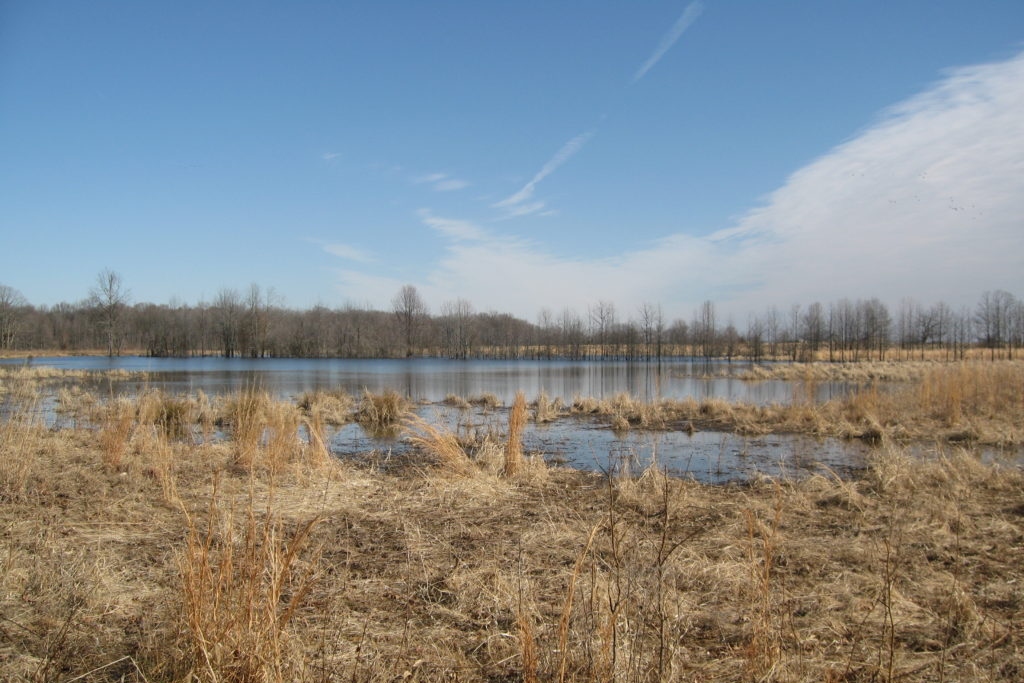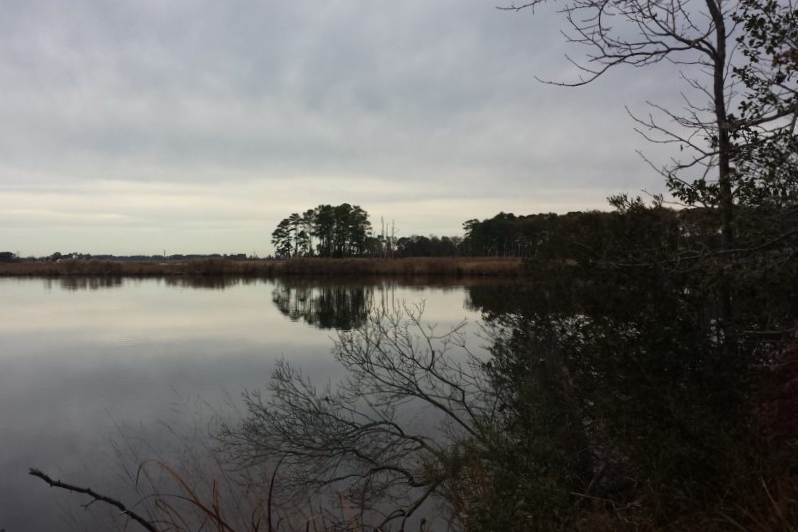Conservation Real Estate Projects
Chesapeake Bay
The Biophilia Foundation’s conservation real estate projects in the Chesapeake Bay resulted in the restoration of over 250 acres of wetlands, planting of 52 acres of forested buffers, and creation of 111 acres of warm season grass meadows. Best management practices were implemented on an additional 607 acres of agricultural land.


Conservation Real Estate Projects
Hutson Trails, Wytheville, VA
Enhancing Forest Health & Habitat
After acquiring a purchase option from the Trust for Public Land, which unfortunately had been unable to secure federal acquisition funding through the Forest Service, the Biophilia Foundation purchased this 1,477 acre property in February of 2007. It consists of mountainous terrain with approximately 99% of the property in forest. The property is surrounded by the Jefferson National Forest on three sides, and thus decreases the habitat fragmentation along this National Forest boundary. Hutson Creek, which runs through the property, is one of the headwaters of the New River. In December of 2007, the Foundation donated a conservation easement on the entire property to the Virginia Outdoors Foundation. The easement allows for a main residence and two cabins to be built in reserved “building envelopes,” and allows forestry that will only enhance forest health and protects wildlife habitat and water quality. Biophilia Foundation sold this protected wildlife preserve to a private buyer in 2012.
Mudford Farm, Chester River, MD
Buy, Restore, Protect, and Re-sell
In 2005, the Biophilia Foundation purchased Mudford Farm in Queen Anne’s County, Maryland. Mudford Farm lies within the headwaters of the Chester River, which runs approximately 40 miles from Delaware to the Chesapeake Bay. The Chester River watershed is home to a wide variety of wildlife. Historically, the river has been recognized as one of the most important waterfowl areas in the Chesapeake Bay region. Unfortunately, major portions of the river are on the Maryland Department of Environment’s “Impaired Waters” list.
Located near the town of Sudlersville on Maryland’s Eastern Shore, Mudford Farm consists of 283 acres, including 113 acres of woodlands. As part of our close partnership with Chesapeake Wildlife Heritage to restore and protect wildlife habitat on farms to further biodiversity conservation in working landscapes, CWH restored 40 acres of wetlands, created 40 acres of warm season grass meadows, and planted 10 acres of trees. This habitat benefits wildlife such as waterfowl, turkey and quail, and improves water quality in the Chester River.
In December of 2010 Biophilia Foundation sold an easement to the State of Maryland under the Conservation Reserve Enhancement Program. The easement permanently protects the restored habitat and most of the existing woodland. A total of 171 acres of habitat were protected by this easement which will allow for the adaptive management of habitat practices in perpetuity. Biophilia then donated an easement to Maryland Environmental Trust and CWH to protect the remainder of the property. The easements allow one new home site, and restrict future farming on the property to the remaining 80 acres of agricultural land possessing the most productive soils. The farm was sold to a private individual in 2012.
This project was chosen by the US Department of Agriculture as a featured “Farm of the Future.”
South River Greenway Project, Annapolis, MD
Long-Term Watershed Protection & Restoration
Located just 10 minutes from the city of Annapolis, Maryland the South River Greenway Project is a comprehensive, long-term watershed protection, restoration, and community outreach initiative. The goal of the project is to create a “central park” in the heart of Anne Arundel County that will benefit the people and wildlife of the region, as well as protect the headwater streams flowing to the South River and Chesapeake Bay. This will be achieved through the permanent protection of 6,000 acres of land, the restoration and stabilization from erosion of 23 miles of first and second order streams, and the restoration and enhancement of upland wildlife habitat.
The Project was initiated by a three year $150,000 grant made to Scenic Rivers Land Trust (SRLT) by the Biophilia Foundation. SRLT, the South River Federation, and Biophilia Foundation have assembled a growing list of partners who are working, planning, and implementing this project. In addition to financial support, the Biophilia Foundation has provided its conservation real estate experience to help SRLT acquire priority property in the Greenway through educating landowners regarding available conservation options, funding sources, and other financial, estate, and tax incentives. Other partners include: Anne Arundel County, Maryland/D.C. Audubon, Maryland Department of Natural Resources, Maryland Environmental Trust, Trust for Public Land, and U.S. Fish and Wildlife Service.
Riverbend Farm, Cambridge, MD
Riverbend Farm is a 236-acre farm with 1.5 miles of waterfrontage. Located across the Little Blackwater River from Blackwater National Wildlife Refuge, it is in one of the most important bird areas in North America. Biophilia Foundation purchased the property in 2002. The project resulted in one of the largest wetland restoration efforts in the Chesapeake Bay watershed during this time period.
In partnership with Chesapeake Wildlife Heritage, a restoration plan was developed and implanted for the property. The project resulted in the restoration of 58 acres of non-tidal wetlands, reforestation of 30 acres of woodlands and the establishment of 11 acres of warm season grass meadows.
The property is protected by a conservation easement that Biophilia helped draft. The easement goes well beyond standard open space easements that prevent only prohibit the construction of houses. This easement also prevents the destruction of the wildlife habitat on the farm.
Today, Riverbend Farm is privately owned and continues to provide a wide diversity of wildlife with valuable habitat and helps filter pollutants before they can reach the Little Blackwater River and Chesapeake Bay.
Talisman Farm, Grasonville, MD
Talisman Farm demonstrates the importance of restoration and preservation. The farm was partially protected by a conservation easement by a previous owner. The objective of this easement was to preserve the open space attributes of the property. While the open space attributes of the property are notable, the easement did not address the significant potential for habitat restoration on the property –restoration that would increase habitat for wildlife and improve water quality in the Chesapeake Bay.
Chesapeake Wildlife Heritage staff analyzed the property and identified a dozen wetland restoration sites. Over the course of two years, 100.8 acres of wetlands were restored at Talisman. An additional 40 acres of riparian buffers were planted along tidal tributaries of the Chesapeake Bay. This work was completed in the most ecologically sensitive farmland on the property.
Talisman is a 820 acre property. It lies on the shores of Prospect Bay and Cabin Creek with the small Hoghole Creek splitting the property in half. In total, the farm has more than 3.5 miles of shoreline along these tidal waters. Located a few miles from the eastern terminus of the Chesapeake Bay Bridge, the property also had 210 acres of mature woodlands.
Griffith Neck Farm, Vienna, MD
Griffith Neck Farm is in one of the coastal Mid-Atlantic region’s most wild places. Nestled between the State of Maryland’s LeCompte Wildlife Management Area and Fishing Bay Wildlife Management and the federal Blackwater National Wildlife Refuge, the property provided an excellent opportunity for a major restoration project.
Biophilia Foundation purchased the property in 2004. The property consisted of a 133-acre woodland and 256 waterfront farm. The woodlot contained more than 100 acres in the Fishing Bay Wetlands Ecologically Significant Area. The farm had more than 1 mile of frontage on the Chicamacomico River.
Biophilia worked with Chesapeake Wildlife Heritage to restore and protect the property. CWH restored 24 acres of wetlands, planted 14 acres of forested buffers along the Chicamacomico River and established 10 acres of warm season grass meadows. This habitat was restored from agricultural land. The property also included 120 acres of tidal wetlands.
Biophilia donated a conservation easement to CWH and the Maryland Environmental Trust. The easement permanently protects the open space and habitat on the property while permitting two additional home sites on the farm. The property is presently privately owned.
Spencer Farm, Rock Hall, MD
Spencer Farm is a 190 acre farm near Rock Hall, Maryland. The property contained significant ecological value even prior to restoration. Herringtown Creek, a tributary of the Chester River, bifurcates the property. At the time of purchase, the property already contained 107 acres of mature woodlands. A municipal sewer line was run along the perimeter of the property, endangering the existing ecological value of the property.
Chesapeake Wildlife Heritage developed and executed a habitat restoration plan for the property. Through CWH’s leadership, 35 acres of non-tidal wetlands were restored at Spencer Farm. Additionally, five acres of warm season grass meadows were established and three acres of forested buffers were planted.
An easement on 40 acres of restored habitat and an additional 18 acres of existing mature woodland was sold to the State of Maryland through the Maryland Conservation Reserve Enhancement Program. The remaining 132 acres of the farm were protected by a conservation easement that was donated to the Maryland Environmental Trust and CWH. Together, the two easements protect the entire 190 acres of the farm and prohibit the destruction of the existing and restored habitat, while permitting only two homes on the property.
The Biophilia Foundation advances biodiversity conservation on private lands by fostering systemic change through people, their communities, and direct action.
Donate
